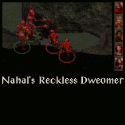|
ritorix posted:You must not have been paying attention. The assassin doesn't need to hide their entire party. Pretty sure they do. The Basic rules on this, and the ones posted upthread by Father Wendigo, read to me that if a combatant notices any opposing threat, they are not surprised. The rules say that some combatants on a side can be surprised, and others not, but nothing about combatants being surprised by one opponent, and not others. It's, naturally, somewhat ambiguous, but precedent is that ambiguity is resolved by DM whim, so we're back to surprise being DM-may-I.
|
|
|
|

|
| # ? May 13, 2024 22:14 |
|
Sade posted:Here's something I've been thinking about for the last day or so that might make a fun thought experiment - assuming we can't change the list of available spells but we can change almost everything else about the way the class interacts with magic (e.g. method of casting, method of memorizing, method of gaining spells), what would it take to balance the wizard? By "balance" here I mean "bring in line with the rest of the base classes in terms of number of options and overall power level." Is it even possible with things like wish in the spellbook? What if the wizard has to devote lots of time or money to high-level spells? Leave the wizard alone, give the fighter and rogue spells.
|
|
|
|
A character or monster just needs to notice "a threat" to be immune to surprise - not the specific threat of the Assassin. It doesn't matter if the monster doesn't see the assassin; The assassin loses his bonuses if the monster spots Fighter or Cleric awkwardly waiting behind a shrub... Or becomes aware of a threat by some kind of bullshit DM fiat. yep E.F.B'd again.
|
|
|
|
That's a really strict view of surprise that would mean it basically never happens if you have a really twitchy character or enemies that always "expect the worst." The reading that makes sense is that everything that rolls initiative is "a threat," so one might notice one threat--of the klutz in plate--but not another threat--of the assassin.
|
|
|
|
eth0.n posted:It's, naturally, somewhat ambiguous, but precedent is that ambiguity is resolved by DM whim, so we're back to surprise being DM-may-I. Well, that's the entire point. Ritorix is a DM, and he willfully misinterpreted the way the surprise rules work. So, now his players get to experience a better rule set than the one initially intended by WotC. That's how Next works.
|
|
|
|
DalaranJ posted:willfully misinterpreted lol It's ok, stealth will all be cleared up in the errata.
|
|
|
|
slydingdoor posted:That's a really strict view of surprise that would mean it basically never happens if you have a really twitchy character or enemies that always "expect the worst." It's consistent with how stealth has always worked in D&D. Just imagine what makes more grog-logic sense; good money that's what's intended: an Assassin makes the whole party, even the fighter in plate, highly stealthy. Or, the fighter in plate draws attention and ruins it for the Assassin. quote:The reading that makes sense is that everything that rolls initiative is "a threat," so one might notice one threat--of the klutz in plate--but not another threat--of the assassin. But what does that mean? There's nothing for what it means to be surprised by one enemy, but not another. The only rules are you're either surprised, and thus don't act on your first turn, or you're not, and you do.
|
|
|
|
S.J. posted:Well I'm at work and we've got the PHB here.
|
|
|
|
ritorix posted:lol  I mean the way you said it is obviously a better rule, and it's probably what they meant. It's just astonishing that they went hog wild with natural language being incapable of writing unambiguous sentences. How many editions of D&D have had stealth errata? Will this make it all of them?
|
|
|
|
Here's another surprise interpretation. Devil's advocacy or whatever. According to the group check rules (Basic p. 59), if half of the group passes a check, the group passes. So if everyone is rolling stealth, even terribly so, and half of the group exceeds a monster's passive perception, that monster is surprised. Compare the highest half of the results with the passive perceptions of the monsters.
|
|
|
|
ritorix posted:lol
|
|
|
|
DalaranJ posted:Well, that's the entire point. Ritorix is a DM, and he willfully misinterpreted the way the surprise rules work. So, now his players get to experience a better rule set than the one initially intended by WotC. That's how Next works. Man comments like these make me hate this thread. It also still just bugs me about how little to no one knows that the game is not called D&D next that was the name of the playtest. The actual game is just D&D or D&D 5e. Anyway Assassins are cool and hit hard. Their goal is to get into position surprise the enemy then take out the strongest one in a single shot. (If they fail well they still have advantage on attack rolls so they can still sneak attack their enemies when the suprise round is over. Nihilarian posted:It's up to the DM. I dislike how you guys ganged up on that given that Mearls did not give this answer to every question. There is nothing wrong with letting the DM decide stuff.
|
|
|
|
seebs posted:Not at all! It's not about winning arguments. I have some loving World Class Argument Winners in my groups. You have no idea the arguments they've had including some that have passed into folk history on this very forum. But that's not the issue when we're sitting on opposite sides of the system saying 'wait, exactly how often and easily is your wizard supposed to be able to buy spell scrolls?' And that's an actual example from actual play. quote:Oh, we occasionally have arguments, but in the current group, I don't think I've ever actually seen someone mad about them. Because, really, we don't care that much about the exact ruling, as long as we can all agree that it's a ruling we can live with, which it turns out we can. quote:I am not at all sure about that. I'll know more in a few months, I guess. That's leaving aside another classic punchline of waiting until it's done. 5e was done before it began.
|
|
|
|
dwarf74 posted:How's the rules? Meh 
|
|
|
|
DalaranJ posted:How many editions of D&D have had stealth errata? Will this make it all of them? gently caress, I still don't know how 4e stealth works and I played it for years. It changed so much that you might as well rip out the original stealth page of the PHB and burn it (or burn the whole thing  ) )
|
|
|
|
A Catastrophe posted:Is the game fun if an elf PC is caught unawares and abducted by the master villain, because they didn't realize their take on a trance is different from the GM's take on a trance? Is the game fun if everyone who chose to play a non-spellcaster suddenly realizes their chances to have a short rest are even more absurdly unlikely than they already were? To say nothing of the mess made by fake-totm combat. The Trance thing is a stupid example as that can happen in anything. Non Casters are not worthless and everyone who thinks they are in this edition can't even understand the basics. It also won't make any difference to chances of having a short rest. If you don't like Totm then don't play it the game is set up so you can easily play with a grid and presents the grid as a option right away. This is not a problem just play with a grid. You can't buy scrolls question unless your DM wants to have a scroll shop in the game. However the default is that their is no scroll shops. Your facts are opinions. dwarf74 posted:How's the rules? In my opinion great.
|
|
|
|
S.J. posted:Well I'm at work and we've got the PHB here. How's the binding and card stock? I don't really care
|
|
|
|
Noncasters are by no means worthless; that's hyperbole deployed by people who haven't really thought through the ramifications of Concentration, reduced spell slots, flattened save DCs, etc. on a 3.X game skeleton. Noncasters are, however, dismissed as unimportant and perfunctory by the basic premise of the game rules. In D&D, a game about using special abilities, being someone without special abilities basically reduces you to a term in an equation. You could replace a fighter with a house rule that every monster the PCs meet begins at 70% of full HP.
|
|
|
|
ritorix posted:(or burn the whole thing Surprise/Stealth has always been a, erm, bugbear, for D&D, especially in editions where it was of key importance because you could be laid out in one round. I think the Next rules for that are pretty good aside from the ambiguity. MonsterEnvy posted:It also still just bugs me about how little to no one knows that the game is not called D&D next that was the name of the playtest. The actual game is just D&D or D&D 5e. This is down to my dislike of marketing rather than my dislike of this game. The day I heard that they were calling it Next I knew they would eventually change the name and vowed to call it Next forever.
|
|
|
|
MonsterEnvy posted:Anyway Assassins are cool and hit hard. Their goal is to get into position surprise the enemy then take out the strongest one in a single shot. (If they fail well they still have advantage on attack rolls so they can still sneak attack their enemies when the suprise round is over. This is contingent on how surprise actually works. Under the "everyone must pass check to surprise" interpretation, no, Assassins are completely lame. They have almost nothing of value. quote:I dislike how you guys ganged up on that given that Mearls did not give this answer to every question. There is nothing wrong with letting the DM decide stuff. Sure, for some stuff. Stuff that strongly interacts with core gameplay, no, that's not an acceptable answer. And he did give that answer for things that should be answered. "GM decides" on how surprise works would be one such case. The two best supported interpretations either mean the Assassin is pretty decent (and stealth-focused Rogues in general actually quite useful), vs Assassins being just about worthless.
|
|
|
|
Yeah when a GM call blows a class out of the water, that's a bad thing to leave to the GM. That's the basic system a system should provide: How does a class work? And how does it work well?MonsterEnvy posted:The Trance thing is a stupid example as that can happen in anything. quote:Non Casters are not worthless and everyone who thinks they are in this edition can't even understand the basics. BTW, they are pretty much worthless. Certainly by higher levels. quote:It also won't make any difference to chances of having a short rest. quote:If you don't like Totm then don't play it the game is set up so you can easily play with a grid and presents the grid as a option right away. This is not a problem just play with a grid. 5e doesn't have TOTM. It has a deliberately omitted rule that will cause no end of trouble for people, especially new DMs. quote:You can't buy scrolls question unless your DM wants to have a scroll shop in the game. However the default is that their is no scroll shops. quote:Your facts are opinions. A Catastrophe fucked around with this message at 03:08 on Aug 8, 2014 |
|
|
|
Sade posted:what would it take to balance the wizard?
|
|
|
|
MonsterEnvy posted:\
|
|
|
|
ritorix posted:Here's another surprise interpretation. Devil's advocacy or whatever. So if half a group only of monsters notices the PCs ...they all do? WHAT'S GOOD FOR THE GOOSE something something GANDER VERISIMILITUDE
|
|
|
|
Why did they lower monk damage? Was 1d6 really ruining low level games?
|
|
|
|
Wow, if one of my players wants to be a monk I'm just going to give them full cleric spellcasting and just tell them to roleplay it as "special techniques." Because that poo poo looks like a spellcasting class with all the spells removed. Monks are cool as hell in concept, why do they always have to suck so hard?
|
|
|
|
Gharbad the Weak posted:Why did they lower monk damage? Was 1d6 really ruining low level games? They are trying to appeal to 3.5 players by making Monks useless. It's such a shame too because during some iterations of the playtest monks were a ton of fun. Looking through old playtests make me sad. Every martial class got weaker and weaker and had fewer and fewer options as it went on.
|
|
|
|
Tell me about it. Playtest Monk at high levels could grab a guy, inflict bludgeon vulnerability, then auto-hit like four times while his fist was on fire.
|
|
|
|
Rosalind posted:They are trying to appeal to 3.5 players by making Monks useless. It's such a shame too because during some iterations of the playtest monks were a ton of fun. Note that people don't actually think Monk sucks, people are just really bad at gauging balance. The people in my local board game group don't allow Monks in their pathfinder games specifically because "they're broken."
|
|
|
|
I remember when a 12th level Monk could teleport their speed at will as their move, that was nice. And back then if you got to 20th level your capstone was setting all your stats to 20. Which was kind of weird and made you spending any of your attribute boosts on actually increasing your stats a bad idea if you had any chance of reaching 20th level. Back in the playtest some classes and subclasses had capstones or high level abilities that basically replenished one or two of their points every round if they had none, or perhaps period even if they had some. This lets Monks at 20th just spam their ki points and the Battlemaster or whatever it is/was called could at that point just keep using maneuvers. This hardly seemed broken, and if anything seemed like it might not be enough. But now every instance of that I can find seems to have been nerfed to pretty much utter uselessness. The only thing that I can think of that was buffed was apparently the Warlock between the Alpha and the PHB, because apparently in the Alpha their spell slots were daily with their level 20 feature allowing them to replenish their slots 1/day after a short rest. But now their slots are refreshed after a short rest and the level 20 feature allows them to 1/day replenish them after 1 minute. Also the Evoker high level feature that adds Int to damage on evocation spells is only once per target, but it seems nothing like that effects the Warlock Invocation that adds Cha to Eldritch Blast damage doesn't have that restriction. Then again Eldritch Blast can only hit up to 4 times and is just a cantrip while the Evoker feature works on all evocation spells.
|
|
|
|
The history of all hitherto existing Dungeons and Dragons editions is the history of class struggles. Wizard and Fighter, Cleric and Monk, Druid and Rogue, Sorcerer and Ranger, in a word, oppressor and oppressed, stood in constant opposition to one another, carried on an uninterrupted, now hidden, now open fight, a fight that each time ended, either in a revolutionary reconstitution of society at large, or in the common ruin of the martial classes.
|
|
|
|
Gharbad the Weak posted:Tell me about it. Playtest Monk at high levels could grab a guy, inflict bludgeon vulnerability, then auto-hit like four times while his fist was on fire. Also I preferred something like this to the spellcasting Elemental monk we eventually got.
|
|
|
|
A Catastrophe posted:Is the game fun if an elf PC is caught unawares and abducted by the master villain, because they didn't realize their take on a trance is different from the GM's take on a trance? Is the game fun if everyone who chose to play a non-spellcaster suddenly realizes their chances to have a short rest are even more absurdly unlikely than they already were? To say nothing of the mess made by fake-totm combat. For as long as I can remember, the consensus has been that if you thought a rule worked differently, you generally get to pick actions that conform to the new rule. So, for instance, if you thought you didn't need to have a guard, but you do, you get to replan your rest arrangement. quote:It's not about winning arguments. I have some loving World Class Argument Winners in my groups. You have no idea the arguments they've had including some that have passed into folk history on this very forum. But that's not the issue when we're sitting on opposite sides of the system saying 'wait, exactly how often and easily is your wizard supposed to be able to buy spell scrolls?' And that's an actual example from actual play. Huh. We normally manage to resolve things like that by some combination of appeal to balance/fun, and it generally isn't much for drama. quote:It's easy to live with a ruling when there's nothing on the line. If that's how you play, you don't need a system. And what if you can't live with a ruling? Back down or get called an rear end in a top hat? Have an argument mid-game? The game is for playing. I guess what I'm not understanding is how exactly you can be genuinely unable to live with a ruling. I mean, worst case, absolutely cannot make the character concept work anymore because of a ruling or a change, I'd expect the GM to let me reroll and get comparable levels/gear.
|
|
|
|
Ryuujin posted:Also I preferred something like this to the spellcasting Elemental monk we eventually got. Yeah, I play a monk in the LP Forum's D&D Next thread, and the PHB is like "Hey, remember those unique abilities monks got? Well now they just cast spells with ki points, isn't that wonderfully boring?" Fortunately, the game is a magical tea party and so we ignore everything we don't like.
|
|
|
|
Ferrinus posted:Noncasters are by no means worthless; that's hyperbole deployed by people who haven't really thought through the ramifications of Concentration, reduced spell slots, flattened save DCs, etc. on a 3.X game skeleton. I don't think I'm convinced by that, partially because I'm not sure this is really "a game about using special abilities". I think that doing a fairly solid amount of damage and being durable are pretty good contributions.
|
|
|
|
Sade posted:Here's something I've been thinking about for the last day or so that might make a fun thought experiment - assuming we can't change the list of available spells but we can change almost everything else about the way the class interacts with magic (e.g. method of casting, method of memorizing, method of gaining spells), what would it take to balance the wizard? By "balance" here I mean "bring in line with the rest of the base classes in terms of number of options and overall power level." Is it even possible with things like wish in the spellbook? What if the wizard has to devote lots of time or money to high-level spells? Personally I have two problems with magic in D&D. Not only is it overpowering, but it's also really boring. It is so dull. Waving a magic wand and instantly solving an encounter is bad game design, but it's also bad storytelling. So make magic have consequences. Start by taking all the big save-or-die spells and giving them major drawbacks. Like Charm Person. Maybe the important NPC isn't listening to your bard's very reasoned arguments, so instead the wizard just casts Charm Person to resolve things. Except, whoops, Charm Person is amazingly illegal to cast on people for obvious reasons, so now you've got to contend with the guards! A good DM will already be doing this, but if it was codified into the rules then it would actually impact how the game is broadly played.
|
|
|
|
EightFlyingCars posted:So make magic have consequences. Start by taking all the big save-or-die spells and giving them major drawbacks. Like Charm Person. Maybe the important NPC isn't listening to your bard's very reasoned arguments, so instead the wizard just casts Charm Person to resolve things. Except, whoops, Charm Person is amazingly illegal to cast on people for obvious reasons, so now you've got to contend with the guards! This is something I'm doing in a sci-fi game I'm working around. Characters get "Powers", some "mundane" but representing exceptional skill, some psionic. But they both work essentially the same way. They do a specific thing automatically, like D&D spells. However, when a power is used, the GM rolls to see if they create a "complication". They always get what the power says it does, but the complication can represent the sort of thing you're talking about.
|
|
|
|
seebs posted:I don't think I'm convinced by that, partially because I'm not sure this is really "a game about using special abilities". It is, though. Look at the breathless wonder with which the text describes magic and spells. Look at the amount of pagespace used to describe not just formal spells but activated powers in general, whether they're monk techniques or warlock invocations or whatever. Look at the lengths that have been gone to to ensure that magic items have unique effects and backgrounds grant access to special actions and so on. The devs themselves say that the basic structure of the game is: you say what you do, and then the DM tells you the result. Spellcasting classes give you new, concrete things to do and back you up with hard rules when you say that you do them. quote:I think that doing a fairly solid amount of damage and being durable are pretty good contributions. Like I said: a term in an equation. You slide the fighter up to a monster and watch the bar floating above the monster's head shrink until it vanishes. Then you slide the fighter up to the next monster. You could replicate the effects of having a fighter around by lowering enemy HP and/or damage by some fraction.
|
|
|
|
The Monks unarmed damage apparently goes up as they level. It will only take me a bit to find how much it does.
MonsterEnvy fucked around with this message at 05:08 on Aug 8, 2014 |
|
|
|

|
| # ? May 13, 2024 22:14 |
|
eth0.n posted:This is something I'm doing in a sci-fi game I'm working around. Characters get "Powers", some "mundane" but representing exceptional skill, some psionic. But they both work essentially the same way. They do a specific thing automatically, like D&D spells. Sounds awful close to some of FATE's mechanics.
|
|
|

























